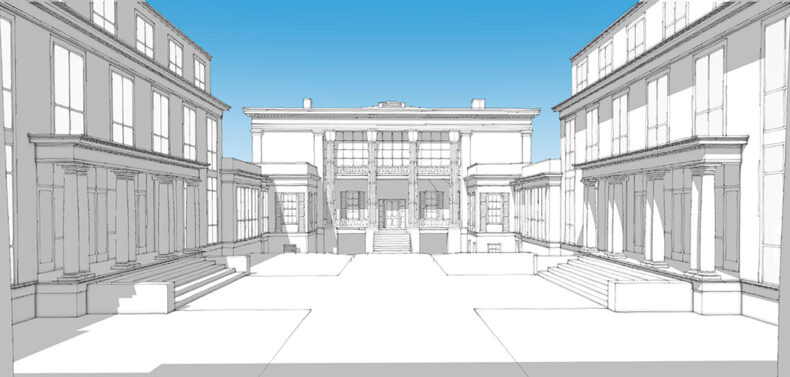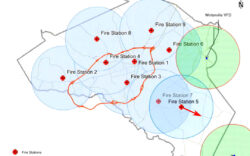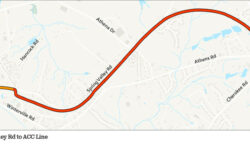A Gainesville, GA developer is preparing to submit plans for a hotel behind the University of Georgia President’s House on Prince Avenue but first is trying to win over skeptical Boulevard residents who think the project is too big.
Capstone Property Group, a company headed by eye doctor Jeffrey Paine that has built several hotels in Gainesville, holds an option to buy the president’s house, which the University System of Georgia put up for sale in 2023. Capstone is proposing a 106-room boutique hotel, and has hired Athens landscape architect Josh Koons and local architectural firm Arcollab to design it. Koons and Arcollab cofounders Lori Bork Newcomer and Joseph Smith gave a presentation to nearby residents late last month.
“The President’s House is a magnificent example of Greek Revival architecture. We are honored to have an opportunity to be part of an adaptive reuse project for this property that will allow its preservation and maintenance for future generations,” Payne said in a statement to Flagpole. “The front and rear gardens will be retained and improved. This upscale hotel project will help provide additional hotel rooms that Athens needs and return millions of dollars to the tax roll [through] property taxes, sales tax and occupancy taxes while having essentially no burden on local services such as schools.”
According to Classic Center President and CEO Paul Cramer, Athens has a shortage of 400 hotel rooms now that Akins Ford Arena is open. In addition, another developer is planning to turn Hotel Abacus (formerly Graduate Athens and the Foundry Inn) into student housing.
In response to concerns expressed at a previous meeting about noise, traffic and light pollution, Koons, Newcomer and Smith said that the hotel would be pulled forward toward Prince Avenue as far as possible, leaving an 80-foot buffer between it and the property line. The long, narrow five-acre lot stretches almost all the way to Boulevard, bordering homes along that street. Social activity would mostly be confined to an interior courtyard.
The hotel would be connected to the main house by two glass hallways. It would be three stories, not exceeding the height of the 40-foot-tall main house, and largely shielded from view to those passing by on Prince. Parking would be underground, with approximately 208 spaces, more than the 155 required by law, Koons said.
The home’s front facade would be preserved, as would much of the interior. The second floor would serve as a presidential suite, with a bar and parlor open to the public on the first floor and a restaurant in the basement. Two outbuildings—a kitchen and the original house, which had already been relocated—would be moved to the rear of the property.
The proposal was met with hostility by some neighbors. “When they said a boutique hotel, I thought maybe 20 rooms,” one said. Another called 100 rooms “an insult.”
“Something this large destroys the character of this block of Prince Avenue,” said Tony Eubanks, a longtime neighborhood activist.
But with the property’s $5 million price tag, something as small as 20 rooms isn’t possible financially, Newcomer responded.
Another concern was traffic. Koons said the hotel would generate almost 1,000 car trips per day. Attendees questioned whether this would lead the city to take out the bike lanes installed two years ago and return Prince to a four-lane configuration, despite the current alignment’s safety benefits and popularity with residents along the corridor. Koons said ACC will require a traffic analysis to determine if changes would need to be made to accommodate additional traffic.
However, Lee Epting, a caterer and historic preservation advocate who operates the county-owned Taylor-Grady House nearby as an event venue, praised the proposal because it protects the historic house, built in 1856 by railroad executive John Thomas Grant. He said it’s unlikely that a family or a law firm, as some suggested, would be able or willing to afford the upkeep. The Board of Regents put the property on the market mainly because the house needs $2 million in repairs, including a new HVAC system and electrical upgrades—expenses the university was no longer willing to pay.
Newcomer also raised the possibility that something residents would like even less could be built if the hotel is not approved. Any proposal would require the ACC Commission to approve a rezoning, as the property is currently zoned “government.” The “commercial neighborhood” category, common along Prince Avenue, would allow a developer to pave over or build on three-quarters of the property, with buildings up to five stories high.
Eubanks provided Flagpole an open letter he wrote to Boulevard residents laying out his argument against the project:
I’ve been getting quite a few calls about the proposed redevelopment of the UGA President’s house into a 106 room hotel. While I’m glad that a wider audience is now aware of the proposal, the first thing I’d like to do is call for measured, informative, sharing of factual based perspectives. No need for pitchforks (yet). It’s a rezone and that process will play out as these things do. But I would like to offer my perspective to add to the conversation.
Since the property came under the control of the UGA Board of Regents in 1949, the rear of the property has served essentially as an intown garden, of some renown, for over 75 years. And while the property does have commercial frontage on Prince Avenue, the rear garden extends ¼ mile from the back porch into the primarily owner-occupied single-family Historic Boulevard neighborhood, one of the oldest neighborhoods in Athens.
Any new use will generate tax revenue but will also be disruptive (understatement) to those who live adjacent to the property (full disclosure, this includes my family), to the neighborhood as a whole, and to all who use Prince Avenue on a regular basis.
The essential question is how much disruption is the community willing to accept?
The proposed hotel is massive, ~95,000 sq ft.
I did some browsing on qPublic to get an idea of what 95,000 sq ft looks like, with these results:
- CCSD offices across Prince Ave from the President’s house – 4 buildings, 36,902 sq ft
- Hotel Indigo – 87,661 sq ft
- ARMC Prince Tower – 125,000 sq ft (estimate based on 25,000 sq ft per floor, 5 stories).
Though designed to be the same height, the mass of this development will dwarf the President’s house.
I’d also like to remind folks that the character of the street, especially traffic counts, changes dramatically at Milledge Avenue, so please keep this in mind when discussing “Prince Avenue”.
It’s not a homogenous street.
~1,000 car trips/day.
I’ll admit to a little selfishness here, but I and many others worked for over 20 years to get the current lane configuration, which has seen overwhelmingly positive response, with two unanimous Mayor and Commission votes over 2 years to affirm that position. The current configuration will probably fail with an extra 1,000 trips/day.
Are you willing to give that up?
Noise.
With all the complaints about short term rentals serving as party houses in single family neighborhoods, this is the Mac Daddy STR. In Boulevard we’ve lived with parties at the Taylor Grady house since forever. However, those events are usually held on weekends and end by 11:00pm. This proposal will be available as an event space 7 days a week, 365 days a year.
Construction.
Think of the massive excavation required to build a 200 car underground parking garage. Even though the plan keeps most of the construction out of the further reaches of the rear garden, what will be the effect of such massive displacement? Construction traffic alone will be a nightmare. And it seems that every project of this nature involves blasting before digging, will that be the case here?
I understand the benefit of maintaining the house and front garden as the historical resources that they are, and Arcolab has worked hard to present a pretty picture. But in my opinion the scale of this proposal with its attendant costs are too high to accept that trade-off.
The Boulevard neighborhood is worth more as an historical resource than the President’s House serving as a facade to a misplaced commercial development of this scale.
The preservation group Historic Athens released a lengthy and somewhat ambiguous statement on the proposal:
Historic Athens is aware of the intense interest and wide range of perspectives regarding the proposed adaptive reuse of the former University of Georgia President’s House at 570 Prince Avenue. This landmark property, originally constructed in 1856 and held by the Georgia Board of Regents, has not served as the president’s residence for decades and, aside from occasional university functions, has been largely underutilized while suffering from years of deferred maintenance. We understand that the Board of Regents has entered into an agreement to sell the property to a private developer, with the final sale contingent upon zoning approval.
We would have preferred to see the University of Georgia maintain ownership and stewardship of this site. However, given the $5 million purchase price and an estimated $2 million in deferred maintenance, the likelihood of reactivation without a substantial investment and likely a commercial use seems low. As such, it is our responsibility to evaluate the current proposal through the lens of long-term preservation outcomes and community benefit.
In the past year, Historic Athens has recognized the preservation and revitalization of two historic hotel projects, the Rivet House and the Bell Hotel, demonstrating that commercial hospitality, when done with care, can play a role in preservation. The current proposal is being led by two preservation-oriented firms, Arcollab and Koons Environmental Design, both of whom are past Historic Athens Preservation Award honorees.
The project would rehabilitate the historic home and integrate it into a hospitality setting, with new construction shaped around a closed U configuration with a central courtyard. This design has already been modified to reduce massing by approximately 60 feet and includes a proposed investment of $7.5 million in underground parking. The development team has also committed to preserving the historic boxwood gardens and is exploring the possibility of relocating a mature, historic ginkgo tree, a rare and costly effort that if feasible, would reflect a preservation-oriented approach.
We acknowledge that any reactivation of this property will bring visible change. As many of our members, trustees, partners, and supporters have expressed, there are concerns about traffic, neighborhood character, and community fit. We recognize those concerns as real and understandable. We also recognize that our trustees and supporters include individuals on all sides of this issue. At the same time, we note that conditions can be placed on planned developments to regulate use, hours of operation, and noise, offering potential pathways to mitigate community impacts.
While some of our constituents are involved in opposing the project, others believe it could help return the site to active use in a preservation-sensitive way. Several community members have pointed to benefits such as the potential to bring a historic property back to active use in the community, additional hotel and property tax revenue, the chance to relieve short-term rental pressure in neighboring historic neighborhoods, and the opportunity for visitors to stay in a place that reflects our history and architectural heritage. The proposal would also open a previously private site to the public through new amenities such as a restaurant, bar, and guest accommodations. Some of our neighboring business owners have shared support for having a hotel within walking distance of Prince Avenue’s shops and restaurants.
We appreciate the design team’s willingness to engage with the public and present their plans at an upcoming Historic Athens History Hour in August. That session is not an endorsement of the proposal, but rather a public forum to learn about the project in detail and ask informed questions. It will allow the community – and Historic Athens – to engage the design team directly and better understand the implications for Prince Avenue, nearby neighborhoods, and the historic structure itself.
Our aim at this time is to remain an informed and engaged voice for preservation. We are continuing to listen closely, observe how the project evolves, and assess whether this proposal ultimately aligns with the long-term goals of protecting, promoting, and sensitively adapting Athens, Georgia’s historic places for the benefit of the community as a whole.
Capstone is aiming to formally submit plans to the Athens-Clarke County government in July, Newcomer told Flagpole.
Like what you just read? Support Flagpole by making a donation today. Every dollar you give helps fund our ongoing mission to provide Athens with quality, independent journalism.









